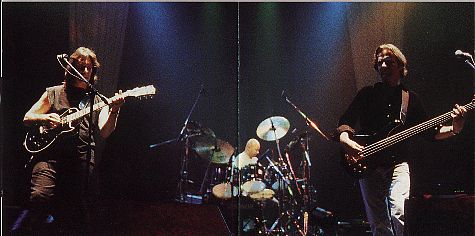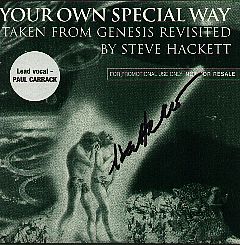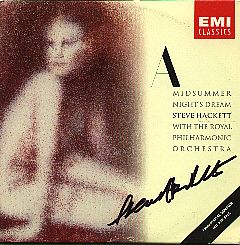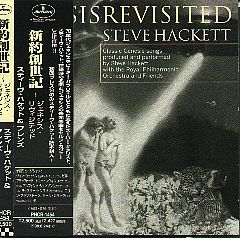"Between the tape deck and the tea cup" - Steve Hackett talks about "A
Midsummer Night's Dream" and his forthcoming recording projects, at Steve's
recording studios on Thursday, August 21, 1997. Interview by Alan Hewitt.
AH: Tell us a little bit about the touring band you had with you for
the "Genesis Revisited" shows in Japan...
| SH: We had Hugo Degenhardt, Roger King, Ian MacDonald... Ian
was on flute and saxes... who else...?
AH: Did this re-working come about from your experiences when
you took the album out on the road for the Japanese shows?
SH: Well... a little bit of it was done after that but most
of it was done beforehand.
AH: Originally, Tony Banks was going to be involved with the
new version of "Los Endos", wasn't he...?
SH: Originally he was invited but then he had to back out due
to other commitments with the new-look Genesis.
AH: What were the Japanese shows like...? |
 Steve on stage with John Wetton and Chester Thompson
Picture courtesy of Kudos/TWR
Steve on stage with John Wetton and Chester Thompson
Picture courtesy of Kudos/TWR |
SH: it was a very interesting line up, chock-full of pals. We had ten
days' rehearsal, which was less than I would have liked. The Japanese were very
attentive, and it was great to work with the guys. I had worked with most of
them before. I had never actually worked with Ian MacDonald although we have
been friends since 1969 or 1970, even before I had joined Genesis, and I had
befriended Ian MacDonald and he was very encouraging towards me at the time,
and he had just left King Crimson, at that point and he was working on the MacDonald-Giles
project, and I was involved with a band called Quiet World at that point, and
Ian was around at one or two of the sessions we had and was active in trying
to find us management. He had been in the army for five or six years with a
guy called Phil Henderson who was one of the guys involved with Quiet World,
so I knew Ian through this ex-army chap... "What has the British Army ever given
me? (in perfect Monty Python accent). Well...I'll tell you..." (Laughter)
Chester Thompson was in the band, Julian Colbeck, John Wetton and myself.
The set we did included some of the things that the others had been involved
in. We did "I Talk To The Wind", "Battlelines", "Heat Of The Moment", "In The
Court Of The Crimson King", which were the songs we had talked about and enjoyed
from Ian's time in Crimson, because Ian had written so many of those early wonderful
songs, so that was very interesting.
AH: Was that your first ever visit to Japan, Steve?
SH: Yes, it was my first ever visit to Japan and we did all the full
tourist bit, the odd visit to an ancestral shrine and I suppose, it was our
immersion in Japanese culture. How long were we there for? Two weeks...? Ten
days...?
AH: Was there anything else that you recorded at the time which you
thought about putting on the album?
| BB (Billy Budis): Ten days but it felt like longer! (laughter).
A five piece band caused the trouble of fifty people! (laughter)
SH: What was interesting was that you would be wide awake at
two o'clock in the morning whatever you tried to do!
BB: We hit the ground running, did all the tourist stuff, the
rehearsals, did the shows and back again in time for Christmas.
AH: And now, of course, the album is scheduled for release in
the UK soon, isn't it?
BB: Yeah, the twenty-second of September.
AH: And the only different track is the new version of "Los
Endos"?
SH: I think we took off "Riding The Colossus". |
|
SH: I did do, funnily enough. I started a version of "In That Quiet
Earth" and I started to record a version of "The Lamb Lies Down On Broadway"
but it seemed as if I couldn't quite get the personnel I wanted at the time.
AH: What happened to those, did they just not have the...?
SH: I thought that "In That Quiet Earth..." it was drastically re-arranged
and it didn't really take off, but I have recorded a version of that from the
Japanese show, or shows I should say which were recorded and I think that the
second show in Tokyo was the one we used and that is due for release at some
point. We did it basically for Japanese TV and it was recorded and mixed for
Japanese TV.
| BB: It was recorded for Japanese TV and broadcast there, a
truncated version, and in addition to which we will be doing a double
live album and video of the whole show and that should be available next
February-ish. It has been a long time coming but we dug a bit of a hole
for ourselves because the Japanese wanted it so quickly, and on top of
that we were doing the "A Midsummer Night's Dream" project and there is
other stuff as well that we are working on and now what we a want to do
is... we are re-issuing the seven UK albums at the same time and then
the live album and then we shall have the decks a little bit clearer!
(laughs). AH: Which albums are being re-issued?
BB: "Bay Of Kings", "Till We Have Faces", "Momentum", "Timelapse",
"Guitar Noir", "Blues With A Feeling", and "There Are Many Sides To The
Night" - that has never been available on retail here in the UK. It was
conceived as a fan thing but there was such interest and the Japanese
wanted it. With the difficulties we have had with various independent
companies we have decoded to take control of them ourselves and use them
as a launch base for our own record label (Camino Records) which will
distribute music by Steve and others once we get the machinery
in place.
AH: That brings us nicely to the "A Midsummer Night's Dream"
project which, last time we spoke, was very much a work in progress. How
did that idea actually come about? |
|
SH: I blame the manager! (laughs). The "Midsummer..." thing came about
as a result of a number of acoustic pieces which I had recorded and had put
on the back burner, thinking this will probably go out on a small independent
label, probably our own at some point. There won't really be any interest from
a major record company, and I found that, on the contrary, EMI were very interested
in my instrumental activities, which is along-winded way of saying, "Classical"
because, to be classical you have to have been dead for so many hundreds of
years! (laughs)
We now use the term "Classical" for it because it embraces the form and the
spirit of it and I don't want to sound too serious about this, and there is
no point in trying to be school masterly about it. I do that kind of music because
I find it fun, and I find that it expresses something that rock and pop don't
really express for me... and jazz. I have probably said this before but it is
not the form really it is the spirit of whatever inhabits that particular form
and you eventually find that all your music reaches you without prejudice as
you receive it. So, you transmit it whatever it happens to be, a pop song, or
a classical piece, ditty etc...
Every time I wrote a piece I just thought, "Oh the perfect title for this
would be 'A Midsummer Night's Dream...'" I just thought it was such a lovely
title, and I never felt comfortable about calling one piece "A Midsummer Night's
Dream" - I felt it was a disservice to Shakespeare and people would just say,
"Oh, you nicked that from Shakespeare..."
| OK, why don't we embrace it long form and try to write a suite of
pieces, or variations if you like, with repeated themes which... seventeen
or eighteen pieces... which, some of which I had begun to take as character
portraits and some of it wasn't you see. A lot of it was adapted so...
I can't remember the exact chronology I must say, but it came about over
a period of seven years. I won't say that I was working on it exclusively
for seven years because I find many things I work on these days... I am
always in arrears with things that I am working on because, even though
I have got my own studio, the things I am working on... the climate isn't
always available for these things to truly grown and reach maturity. Involvement
with this kind of project is where you realise that you are embracing
very traditional kinds of material, you are plugging into an existing
tradition and in order to embrace it fully you have to throw aside the
idea of doing something "new".
Really what you are doing is like looking at statue, an existing edifice
from a slightly different angle from the way people have looked at it
in the past. I find that if there is a thread here it is the idea of taking
mythological subjects like we did with Genesis where they were explained
with narrative and supplanting narrative in this case with things that
pertain more to the "Tone Poem". I find it is only Classical terminology
that will explain some of the things I am after. It is interesting, I
have just remembered something that I read about Rachmaninov, who was
being criticised for writing very romantic stuff when everybody else was
writing totally atonal stuff and it was something to the effect that he
just wrote down the music that he heard in his head, he didn't try to
be overly romantic or traditional or anything, and I think that is brave,
because what you are saying is, "As I receive it, I transmit it..." and
that is what I did in this case. |
|
I listened to what the muse said when she came calling. I let it led me, you
see...The reaction to it has been thrilling and I am very humbled by it considering
that I started off with the premise of not necessarily embracing the ethic of
originality but in some way that left me free to express... or for the music
to express itself through me and I tended to read the play a lot.
AH: Did you read the play before you a started the project...?
SH: I was reading it before the project and I was reading it
as the project was continuing, and I was trying in as much as it was possible...
and you can stick me in "Pseuds Corner" for this... (laughter). I was trying
to talk to Shakespeare and ask what he would have liked... I wanted to find
out... I wanted to know and what kept coming back was this idea of... it doesn't
really matter what period it inhabits, you know, it is timeless, and in a way
this has got a thread of all sorts of other things like Paul McCartney and the
"Rupert" books. Why did he do "The Frog Song"? and why is it that so many musicians
I know, my father, my brother, my nephew, why do they all read the "Rupert"
books? And I think that it is the timeless nature of it, the fact that a pirate
will wander in and is followed by a professor from the late nineteen hundreds,
and a Chinaman from God knows when!
The fact that they can all co-exist as separate characters and it can all
be cohesive and they are all separate characters from different periods but...
and this was something that I had been thinking about so, I told myself, "Let's
not worry if something sounds early Twentieth Century, or late Nineteenth or
Elizabethan or whatever... Let's not really worry about that but let each character
develop..." For instance, Helena who represented for me, unrequited love, and
I felt that it should be basically sad and then right at the end she is joined
by strings because her dreams do eventually come true. I suppose it was the
idea of the "Heavenly Voices" and I took a very romantic approach toward it
and I must say that I have been less comfortable with the adaptations of Shakespeare
that look more like a Rock video and for me it loses a lot of the grace when
it is leatherjackets and studs, mainly because I have inhabited that region
and so... (laughs). Maybe I am a frustrated Shakespearean actor or director,
trying to straddle both those areas, and maybe I have done that in a way.
AH: The only thing that worries me now is, how can you possibly top
this project...?
SH: I am at work on two more projects, one of which is another rock
album, a rock album that is very lyrically intensive and maybe "rock" is the
wrong word really. I think it is an album full of songs perhaps. There is another
Classical thing in the works which is being written and which is something that
relates to this, which is guitar and orchestra and which is very close to my
heart as it happens. I feel that in music I am revealing more of myself all
of the time and having more revealed to me and I think music is getting... the
older I get, music is becoming more and more personal, and there will be more
surprises I think because up to now I think I have operated more in the third
person and not always as directly as I might have done because I have needed
to find my "voice" and I don't necessarily mean that in the strictly literal
sense although that is something that has concerned me a lot and I have managed
to express myself as a singer in the way that I have wanted and just recently
there has been this little collection of songs which are on the back burner
but those are the things that have concerned me a lot more recently...
And there we have to end this fascinating chat with Steve for this issue.
Next time round we will continue our chat about his current projects and delve
a little further back to Steve's time in Genesis. Again, my thanks to Steve
for giving up such an enormous amount of his time to speak to me when I am sure
he had much more interesting things to do! Thanks also to Steve's manager, Billy
Budis for arranging everything and to Steve's good lady wife, Kim Poor for all
her kindness and hospitality.



